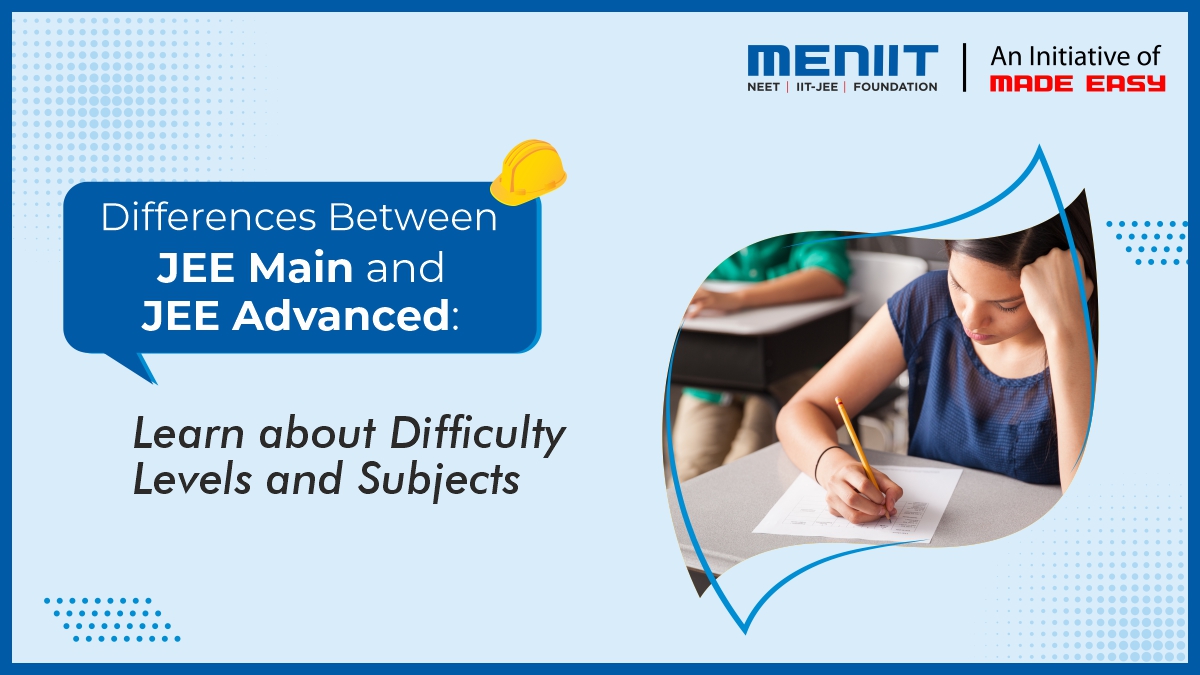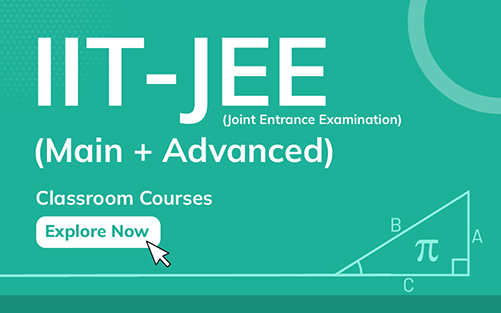Difference Between JEE Main and JEE Advanced: Learn about Difficulty Levels and Subjects

JEE Mains and JEE Advanced are exams that open the doors to various top engineering colleges in India. It is very important for IIT JEE aspirants to understand the major differences between JEE Main and JEE Advanced.
In this blog by MENIIT, we will look into the major differences between JEE Main and JEE Advanced to help aspirants understand the nature and difficulty level of both exams. Also, we will address some FAQs.
Introduction to JEE Main & JEE Advanced
If you aspire to be an engineer, you are aware of the Joint Entrance Examination, commonly known as JEE. However, the difference between JEE Main and JEE Advanced may cause some confusion.
The Joint Entrance Examination (JEE) is one of the toughest examinations in India for admission into top engineering institutions. It is divided into two stages: JEE Main and JEE Advanced.
While both exams serve as gateways to engineering programs, the differences between them lie in terms of difficulty levels and colleges.
JEE Main: It is conducted by the National Testing Agency (NTA) twice a year in the months of January and April, offering students flexibility in choosing their attempt.
JEE Advanced: JEE Advanced is the second-stage examination for those who qualify for JEE Main. Generally conducted in the month of May or June.
* Only qualified candidates from JEE Main are eligible to appear for JEE Advanced.
Understanding the Differences: JEE Main vs JEE Advanced
| Topics | JEE Main | JEE Advanced | |
|---|---|---|---|
| Syllabus | JEE Main includes 11th and 12th std. Physics, Chemistry and Mathematics. | Class 11 and 12 Physics, Chemistry, and Mathematics, as well as Advanced Concepts. These advanced concepts are not present in the NCERT books. | |
| Types of Question(s) | Multiple-choice questions(MCQs) and numerical-based questions(NBQs) |
|
|
| Exam Duration | 3 hours | 6 hours (Paper 1 – 3 hours, Paper 2 – 3 hours). | |
| No. of Questions & Marking Scheme |
|
Approximately 54 questions in each paper Each paper of 180 marks Pattern, marks, and number of questions may vary yearly. | |
| Difficulty level | Comparatively easier than JEE Advanced | JEE Advanced is considered as one of the most difficult exams in India at the undergraduate level. | |
| Question Paper Languages | The JEE Main question paper is in English, Hindi, Gujarati, Assamese, Bengali, Kannada, Malayalam, Marathi, Odia, Punjabi, Tamil, Telugu and Urdu. | The JEE Advanced question paper is in English and Hindi only. | |
| Conducting Authority | National Testing Agency (NTA) | Conducted by IITs | |
Difficulty Levels and Subjects: JEE Main Vs JEE Advanced
JEE Main: Testing the Waters
- JEE Main is the first stage of the IIT-JEE. It checks the basic understanding of PCM of aspirants in the 11th and 12th grades.
- JEE Main is considered relatively easier than JEE Advanced. The difficulty level of the questions varies from year to year. However, they are framed in a manner to assess the conceptual understanding and problem-solving skills of aspirants.
- The difficulty level, while challenging, is within the reach of students who have a strong grasp of their class 11 and 12 syllabus.
Admission to Undergraduate Degree Courses after JEE Main
National Institutes of Technology (NITs): A good JEE Main score opens doors to renowned NITs across the country.
Indian Institutes of Information Technology (IIITs): Many IIITs also consider JEE Main scores for admission.
State Engineering Colleges: State-level engineering colleges use JEE Main scores for admissions, providing ample options for candidates.
JEE Advanced: Exploring the Frontiers
- JEE Advanced is known for its higher difficulty level.
- The JEE Advanced exam evaluates in depth understanding of the subjects.
- The questions in JEE Advanced often require multiple concepts to be solved.
- The JEE Advanced exam is structured to identify candidates who not only have a strong theoretical foundation but also have advanced problem-solving skills.
- The questions are framed from the syllabus of classes 11 and 12, but are of an advanced level.
In a nutshell, while JEE Main covers the basics, JEE Advanced explores the depth of concepts in PCM.
Perks of Cracking JEE Advanced
The JEE Advanced entrance exam is the gateway to the prestigious Indian Institutes of Technology (IITs) and other top technical institutions in India. IITs and all these institutions offer a wide range of UG engineering programs. Apart from studies, IIT provides global recognition. Graduates from IITs are globally recognised, making it easier to pursue advanced studies or work internationally. Many successful top Indian entrepreneurs and industry key leaders are IIT alumni. After completing a degree from IITs with the finest knowledge and industry-oriented skills one can start their own enterprise to contribute to the national economy.
Other than IITs, students can also join various institute to study pure science like IISC.

Frequently Asked Questions (FAQs)
Which exam is difficult: JEE Main or JEE Advanced?
Both JEE Main and JEE Advanced are challenging exams, but they have different levels of difficulty. JEE Main is considered relatively less difficult compared to JEE Advanced.
How to crack JEE Main & JEE Advanced?
Both exams can be cracked with good and dedicated preparation, a strong foundation in PCM, and consistent practice. Candidates should keep a check on their strong and weak topics, and plan their preparation strategy accordingly. Apart from preparation, guidance from experienced faculty, like those at MENIIT, can significantly contribute to a student’s success in these competitive exams.
What are the subjects covered in both exams?
Questions in both exams are asked from physics, chemistry, and mathematics up to class 12th.
Are there additional topics in JEE Advanced compared to JEE Main?
Yes, there are some additional topics in JEE Advanced as compared to JEE Main.
How should candidates prepare differently for JEE Main and JEE Advanced?
While the foundational concepts are important for both exams, candidates aiming for JEE Advanced should prepare it along with their JEE Main preparation in classes 11th and 12th. Aspirants should study each subject deeply, practice advanced problems, and focus on time management skills.
Does JEE Advanced require a separate preparation?
The JEE Advanced doesn’t require separate preparation in terms of studying concepts and topics. The key difference arises during the practice of mock tests and solving previous-year papers for JEE Main and JEE Advanced, as both exams have slightly different exam patterns.
Dear Aspirants!MENIIT is a platform where you can get expert insights and invaluable study tips on IIT-JEE, NEET, and other entrance examinations. Stay ahead of the competition with MENIIT. Ace these exams with our proven strategies, and stay informed about the latest exam updates and precious tips from our experts.
So, hurry up, subscribe to the MENIIT YouTube channel now, and never miss an update on new videos.
















